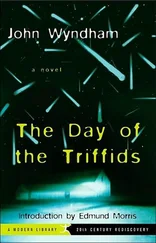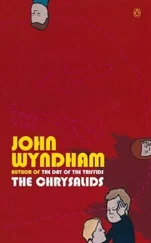John Wyndham - The Midwich Cuckoos
Здесь есть возможность читать онлайн «John Wyndham - The Midwich Cuckoos» весь текст электронной книги совершенно бесплатно (целиком полную версию без сокращений). В некоторых случаях можно слушать аудио, скачать через торрент в формате fb2 и присутствует краткое содержание. Жанр: Фантастика и фэнтези, на английском языке. Описание произведения, (предисловие) а так же отзывы посетителей доступны на портале библиотеки ЛибКат.
- Название:The Midwich Cuckoos
- Автор:
- Жанр:
- Год:неизвестен
- ISBN:нет данных
- Рейтинг книги:4 / 5. Голосов: 2
-
Избранное:Добавить в избранное
- Отзывы:
-
Ваша оценка:
- 80
- 1
- 2
- 3
- 4
- 5
The Midwich Cuckoos: краткое содержание, описание и аннотация
Предлагаем к чтению аннотацию, описание, краткое содержание или предисловие (зависит от того, что написал сам автор книги «The Midwich Cuckoos»). Если вы не нашли необходимую информацию о книге — напишите в комментариях, мы постараемся отыскать её.
The Midwich Cuckoos — читать онлайн бесплатно полную книгу (весь текст) целиком
Ниже представлен текст книги, разбитый по страницам. Система сохранения места последней прочитанной страницы, позволяет с удобством читать онлайн бесплатно книгу «The Midwich Cuckoos», без необходимости каждый раз заново искать на чём Вы остановились. Поставьте закладку, и сможете в любой момент перейти на страницу, на которой закончили чтение.
Интервал:
Закладка:
Janet weakened a little.
'You mean, you want us, or someone, to do that for you. To watch for, and note, any effects?'
'What I'm after is a reliable source of information on Midwich as a whole. I want to be kept posted and up to date on how things are here so that if it should become necessary to take any steps I shall be aware of the circumstances, and be better able to take them in good time.'
'Now you're making it sound like a kind of welfare work,' Janet said.
'In a way, that's what it is. I want a regular report on Midwich's state of health, mind, and morale so that I can keep a fatherly eye on it. There's no question of spying. I want it so that I can act for Midwich's benefit, should it be necessary.'
Janet looked at him steadily for a moment.
'Just what are you expecting to happen here, Bernard?' she asked.
'Would I have to make this suggestion to you if I knew?' he countered. 'I'm taking precautions. We don't know what this thing is, or does. We can't slap on a quarantine order without evidence. But we can watch for evidence. At least, you can. So what do you say?'
'I'm not sure,' I told him. 'Give us a day or two to think it over, and I'll let you know.'
'Good,' he said. And we went on to talk of other things.
Janet and I discussed the matter several times in the next few days. Her attitude had modified considerably.
'He's got something up his sleeve, I'm sure,' she said. 'But what?'
I did not know. And:
'It isn't as if we were being asked to watch a particular person, is it?'
I agree that it was not. And:
'It wouldn't be really different in principle from what a Medical Officer of Health does, would it?'
Not very different, I thought. And:
'If we don't do it for him, he'd have to find someone else to do it. I don't really see who he'd get, in the village. It wouldn't be very nice, or efficient, if he did have to introduce a stranger, would it?'
I supposed not.
So, mindful of Miss Ogle's strategic situation in the post office, I wrote, instead of telephoning, to Bernard telling him that we thought we saw our way clear to cooperation provided we could be satisfied over one or two details, and received a reply suggesting that we should arrange a meeting when we next came to London. The letter showed no feeling of urgency, and merely asked us to keep our eyes open in the meantime.
We did. But there was little for them to perceive. A fortnight after the Dayout, only very small rumples remained in Midwich's placidity.
The small minority who felt that Security had cheated them of national fame and pictures in the newspapers had become resigned: the rest were glad that the interruption of their ways had been no greater. Another division of local opinion concerned The Grange and its occupants. One school held that the place must have some connexion with the event, and but for its mysterious activities the phenomenon would never have visited Midwich. The other considered its influence as something of a blessing.
Mr Arthur Crimm, OBE, the Director of the Station, was the tenant of one of Zellaby's cottages, and Zellaby, encountering him one day, expressed the majority view that the village was indebted to the researchers.
'But for your presence, and the consequent Security interest,' he said, 'we should without doubt have suffered a visitation far worse than that of the Dayout. Our privacy would have been ravaged, our susceptibilities outraged by the three modern Furies, the awful sisterhood of the printed word, the recorded word, and the picture. So, against your inconveniences, which I am sure have been considerable, you can at least set our gratitude that the Midwich way of life has been preserved, largely intact.'
Miss Polly Rushton, almost the only visitor to the district to be involved, concluded her holiday with her uncle and aunt, and returned home to London. Alan Hughes found himself, to his disgust, not only inexplicably posted to the north of Scotland, but also listed for release several weeks later than he had expected, and was spending much of his time up there in documentary argument with his regimental record office, and most of the rest of it, seemingly, in correspondence with Miss Zellaby. Mrs Harriman, the baker's wife, after thinking up a series of not very convincing circumstances which could have led to the discovery of Herbert Flagg's body in her front garden, had taken refuge in attack and was belabouring her husband with the whole of his known and suspected past. Almost everyone else went on as usual.
Thus, in three weeks the affair was nearly an historical incident. Even the new tombstones that marked it might – or, at any rate, quite half of them might – have been expected so to stand in a short time, from natural causes. The only newly created widow, Mrs Crankhart, rallied well, and showed no intention of letting her state depress her, nor indeed harden.
Midwich had, in fact, simply twitched – curiously, perhaps, but only very slightly – for the third or fourth time in its thousand-year doze.
And now I come to a technical difficulty, for this, as I have explained, is not my story; it is Midwich's story. If I were to set down my information in the order it came to me I should be flitting back and forth in the account, producing an almost incomprehensible hotchpotch of incidents out of order, and effects preceding causes. Therefore it is necessary that I rearrange my information, disregarding entirely the dates and times when I acquired it, and put it into chronological order. If this method of approach should result in the suggestion of uncanny perception, or disquieting multi-science, in the writer, the reader must bear with it the assurance that it is entirely the product of hindsight.
It was, for instance, not current observation, but later inquiry which revealed that a little while after the village had seemingly returned to normal there began to be small swirls of localized uneasiness in its corporative peace; certain disquiets that were, as yet, isolated and unacknowledged. This would be somewhere about late November, even early December – though perhaps in some quarters slightly earlier. Approximately, that is, about the time that Miss Ferrelyn Zellaby mentioned in the course of her almost daily correspondence with Mr Hughes that a tenuous suspicion had perturbingly solidified.
In what appears to have been a not very coherent letter, she explained – or, perhaps one should say, intimated – that she did not see how it could be, and, in fact, according to all she had learnt, it couldn't be, so she did not understand it at all, but the fact was that, in some mysterious way, she seemed to have started a baby – well, actually 'seemed' wasn't quite the right word because she was pretty sure about it, really. So did he think he could manage a weekend leave, because one did rather feel that it was the sort of thing that needed some talking over...?
Chapter 7. Coming Events
In point of fact, investigations have shown that Alan was not the first to hear Ferrelyn's news. She had been worried and puzzled for some little time, and two or three days before she wrote to him had made up her mind that the time had come for the matter to be known in the family circle: for one thing, she badly needed advice and explanation that none of the books she consulted seemed able to give her; and, for another, it struck her as more dignified than just going on until somebody should guess. Angela, she decided, would be the best person to tell first – Mother, too, of course, but a little later on, when the organizing was already done; it looked like one of those occasions when Mother might get terribly executive about everything.
Decision, however, had been rather easier to take than action. On the Wednesday morning Ferrelyn's mind was fully made up. At some time in that day, some relaxed hour, she would draw Angela quietly aside and explain how things were...
Читать дальшеИнтервал:
Закладка:
Похожие книги на «The Midwich Cuckoos»
Представляем Вашему вниманию похожие книги на «The Midwich Cuckoos» списком для выбора. Мы отобрали схожую по названию и смыслу литературу в надежде предоставить читателям больше вариантов отыскать новые, интересные, ещё непрочитанные произведения.
Обсуждение, отзывы о книге «The Midwich Cuckoos» и просто собственные мнения читателей. Оставьте ваши комментарии, напишите, что Вы думаете о произведении, его смысле или главных героях. Укажите что конкретно понравилось, а что нет, и почему Вы так считаете.












